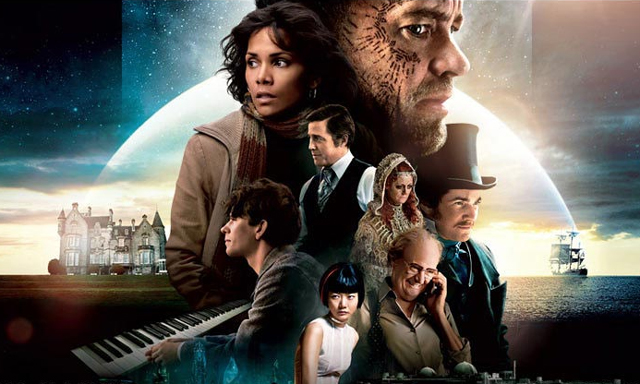 Film: Cloud Atlas
Film: Cloud Atlas
Country: German/USA/Hong Kong/Singapore
Year of Release: 2012
Directors: Lana and Andy Wachowski, Tom Tykwer
Screenwriters: Lana Wachowski, Andy Wachowski, Tom Tykwer
Starring: Tom Hanks, Halle Berry, Jim Broadbent, Hugo Weaving, Jim Sturgess, Doona Bae, Ben Whishaw, Susan Sarandon, Hugh Grant
Review: Peter Machen
♥♥♥½
Cloud Atlas is a remarkably ambitious film that chronicles a number of interconnected narratives played out across continents and centuries. Based on the critically acclaimed novel by David Mitchell, the film is unusual in that it is directed by two separate directing teams, the Wachowski siblings, previously responsible for the Matrix trilogy, and Tom Tykwer, the German director made famous by Run Lola Run. The two teams directed separate segments of the films in separate locations, with the various stories subsequently edited together into a fast-paced narrative that attempts to distil history into something akin to a recognisable pattern of love, freedom and desire sprinkled with human foibles, courage and failure.
To provide anything approaching an accurate plot synopsis would take more space than a single tabloid page provides, but suffice to say that the film’s narratives range from a young gay composer (Ben Whishaw) in the 19th century who makes his services available to an older composer (Jim Broadbent), resulting in a musical piece called the Cloud Atlas Sextet, to the Blade Runner-style world of New Seoul sets aeons into the future where beautiful young woman are bred purely to serve in the fast food industry. In between, there’s the story of a wily publisher (Broadbent again) whose long-suffering brother gets his revenge by checking him into a high security home for the infirm, the tale of a gradually evolving friendship between a slave (Keith David) and a wealthy colonialist (Jim Sturgess), a narrative about the uncovering of an intentionally faulty nuclear power station and, finally, a story set on a post-apocalyptic island in which the tribal people are visited by a woman (Halle Berry) from even further into the future who gravitates towards a particularly neurotic tribesman (Tom Hanks) who is haunted by a dark, inhuman apparition.
These various narratives don’t so much intersect with each other, as overlap in terms of small but important details and also in terms of the same actors popping up throughout history playing radically different roles, sometimes switching gender, race and sexual orientation, often courtesy of prosthetic transformation which renders them virtually unrecognisable. The resulting meta-narrative tells of small ripples in time whose effects continue for centuries into the future, emphasising the interconnected nature of all human enterprise.
There are several major problems with the film, although depending on the degree to which this rambling and visually impressive film enchants you, they will either be easily dismissable or major stumbling blocks. Firstly, the acting is not consistent, both across the film’s cast, and across the multiple performances from individual actors. This may well have something to do with the split directorial duties, but it also seems likely that the film’s large – but not excessive, considering the scale of its ambition – budget of $100 million might have lead to the obligatory use of big name stars. I’ve never been a fan of Tom Hanks, and the gee-shucks obviousness of his performance robs Cloud Atlas of nuance. Similarly, Halle Berry, whose beauty and charisma I’m always been quite taken with, could have been pushed harder to deliver the goods with greater conviction. Then there’s the fact that the film’s prosthetics and physical transformations are on occasion more than a little hokey. For example, it was only some time after watching the film that I realised that in the New Seoul sequence Jim Sturgess’ strange forehead and eyes were designed to make him look Asian, as opposed to some futuristic mutant, which had been my presumption.
Cloud Atlas doesn’t work in its entirety. It’s too sprawling, too inconsistent and ultimately – and here’s the irony – too disconnected. But there’s something about the deep and profound desires it contains that I found quite moving. While cynics might find the underlying theme of interconnection a little cloying and overstated – which it is in many ways – the film’s other core theme of love that transcends gender, race and sexuality is for the most part successful. Lana Wachowski, who is herself transgender and has undergone a sex change, was recently awarded a Human Rights Campaign award for her courageous decision to out herself as a transgendered person. In response, she spoke about a global society “that refuses to acknowledge the spectrum of gender in the exact same blind way they have refused to see a spectrum of race or sexuality.”
That statement highlights one of the most significant aspects of Cloud Atlas. While the film is initially challenging to viewers in its relentless shift between strands of narrative, as the various pieces fall into place the film gradually becomes something akin to a mainstream movie. Yet it says much about the evolution of global culture that the shifts of sexual identity that take place are at the centre of a major big budget film that will enjoy wide release around the world. Score at least one point for the so-called freaks and outsiders. May there be ever more of them and may they be ever more visible.
For its focus on the essential blurry nature of identity, rendered in accessible terms, Cloud Atlas is an important and visionary film, even if for no other reason.
